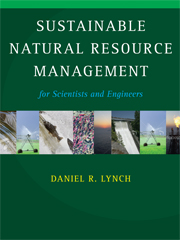4 - THE COHORT
Published online by Cambridge University Press: 31 January 2011
Summary
Here we present the final development of the living resource. The “cohort” imagined is a group of identical individuals. It is recruited into a population and develops thereafter, subject to natural and managed mortality. It is described in terms of number of individuals and the weight of the average individual. Once recruited, this cohort decreases in number while increasing in individual biomass. A basic decision on harvesting is twofold: when to begin, and how hard to work at it.
This analysis treats recruitment of each cohort as exogenous. It occurs regularly, timed with the population, without relation to the mature individuals surviving in previous cohorts. This is one of the limits studied in Chapter 3. In the fisheries literature, this corresponds to abundant spawning but highly variable survivorship in the larval stage, prerecruitment. In other contexts, it corresponds to completely controllable recruitment as in agriculture or silviculture, where cohorts are imported and “planted.” Readers will recognize the Forester and Faustman criteria from the forestry literature here.
Cohorts are assumed to be long-lived (many years) relative to the recruitment interval (e.g., annual) and mixed together. Individual age is assumed identifiable; hence the notion of “year class” being the survivors of a certain recruitment event. Even when recruitment is uncontrollable, it is observable after the fact in the early-year classes.
Uncontrolled recruitment (e.g., wild fisheries) creates a challenge for monitoring and managing the population, and several distinct cases are explored.
- Type
- Chapter
- Information
- Sustainable Natural Resource ManagementFor Scientists and Engineers, pp. 95 - 130Publisher: Cambridge University PressPrint publication year: 2009



